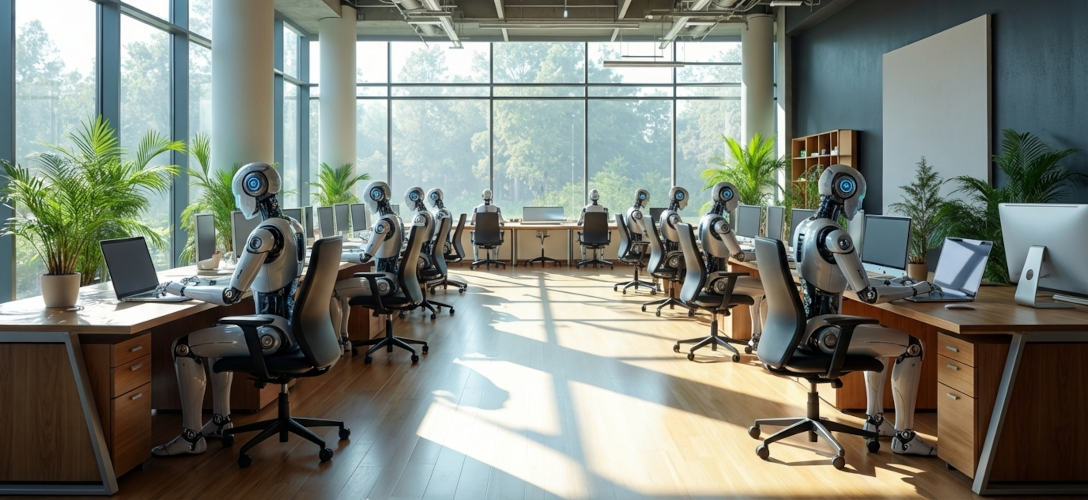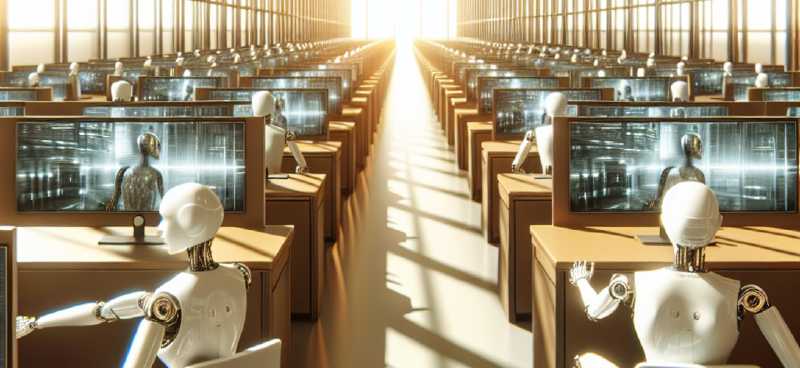
Why a Company with Only AI Employees Won't Operate?

Why a Company with Only AI Employees Won't Operate?
In recent years, the tech industry has been abuzz with the potential of artificial intelligence (AI) to revolutionize business operations. The idea of a company run entirely by AI is tantalizing: a workforce that operates efficiently, without errors, at very low cost, and without downtime. This vision promises significant profit margins and operational excellence. However, while the concept is intriguing, the practical implementation of an AI-only company faces several challenges.
Why It Might Work?
The rapid advancements in AI, particularly in Large Language Models (LLMs), have shown that these systems can process large sets of complex information, summarize data, apply logical reasoning, and generate conclusions. These capabilities align closely with the tasks performed by many knowledge workers. If we extrapolate the current rate of AI development, it is conceivable that AI could manage 100% of the tasks in a relatively standard company within a few months.
Key Requirement
For AI to manage a entire company, it must be trained on extensive data sets that reflect the company’s operations. This is feasible for companies operating in established fields with well-defined job descriptions, business models, and products. However, AI struggles when faced with new paradigms, new job descriptions, or new business models. Since AI is trained on historical data, it lacks the ability to navigate uncharted territories and address unprecedented challenges.
What About the CEO?
An interesting experiment recounted in the Harvard Business Review explored the performance of AI versus human CEOs in decision-making within a simulated environment. The AI outperformed graduate students in many aspects but was ultimately “fired” by the virtual board for two critical flaws:
- Struggling with Black Swan Events: AI systems are inherently limited by their training data. They excel in predictable environments but falter when faced with rare, unpredictable events - known as black swan events. These events require a level of intuition, creativity, and adaptability that AI currently lacks.
- Short-Term Optimization Mindset: AI tends to focus on short-term gains and optimizations, often at the expense of long-term strategy. This myopic view can be detrimental to a company’s sustained success and growth.
Could CEO Manage a Swarm of AI?
Theoretically, a human CEO could oversee a company where all other positions are filled by AI. However, this setup would still face significant challenges. The CEO would need to manage and coordinate the AI systems, ensuring they align with the company’s long-term vision and strategy. This task requires a deep understanding of both the business and the AI systems, as well as the ability to make judgment calls that AI cannot.
What Makes a Company Great?
In his book Good to Great, Jim Collins analyzes why some companies make the leap to greatness while others do not. Collins and his team identified several key factors, including the presence of Level 5 Leaders - individuals characterized by humility and strong will. These leaders play a crucial role in driving long-term success and fostering a positive company culture.
Can AI Imitate Level 5 Leadership?
While it is possible to prompt an LLM to imitate characteristics such as humility and fierce resolve, these traits are deeply human and context-dependent. AI can mimic behaviors but lacks the genuine emotional intelligence and nuanced understanding required to inspire and lead a team effectively. The human touch in leadership is irreplaceable, especially when navigating complex interpersonal dynamics and making ethical decisions.
What About Trust?
Trust is a cornerstone of any successful organization. Employees need to trust their leaders, especially during challenging times. This trust is built through consistent, transparent communication, empathy, and shared experiences. It is difficult to imagine a scenario where a human CEO could leverage the trust of AI systems to make critical decisions that are not 100% rational but essential for the company’s survival.
The Human Element
An enterprise is fundamentally a human adventure. The models we are accustomed to involve numerous human components, and all the management tools, business books, methodologies, and processes we know are based on human interaction. AI, at its core, is an imitation of human intelligence. While it can enhance and accelerate tasks, it cannot fully replace the human element in a company.
The Future of AI in Business
It is not about replacing all humans in a company or even a single position in all companies. Instead, AI should be viewed as a powerful tool that can augment human capabilities. By automating routine tasks, AI can free up human employees to focus on higher-level strategic thinking, creativity, and relationship-building.
Long-Term Supervision
AI systems require long-term supervision by humans to ensure they operate effectively and ethically. This supervision involves continuous monitoring, updating, and fine-tuning of AI models to adapt to changing business environments and emerging challenges. Human oversight is essential to address the limitations of AI and to make judgment calls that go beyond data-driven decisions.
Conclusion
While the idea of a company run entirely by AI is fascinating, it is not feasible in practice. AI systems excel in specific, well-defined tasks but struggle with unpredictability, long-term strategy, and the human elements of leadership and trust. The future of business lies in a harmonious collaboration between AI and human employees, where AI enhances human capabilities and humans provide the oversight, creativity, and emotional intelligence that AI lacks. By leveraging the strengths of both, companies can achieve greater efficiency, innovation, and resilience in an ever-evolving business landscape.
We are Here to Empower
At System in Motion, we are on a mission to empower as many knowledge workers as possible. To start or continue your GenAI journey.
You should also read


Who Will Make Money with AI? Exploring the Generative AI Value Chain
Article 4 minutes readLet's start and accelerate your digitalization
One step at a time, we can start your AI journey today, by building the foundation of your future performance.
Book a Training